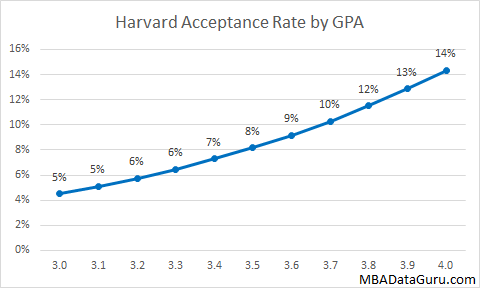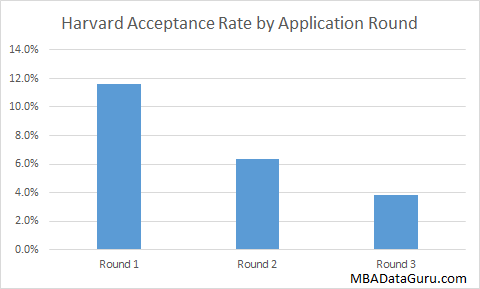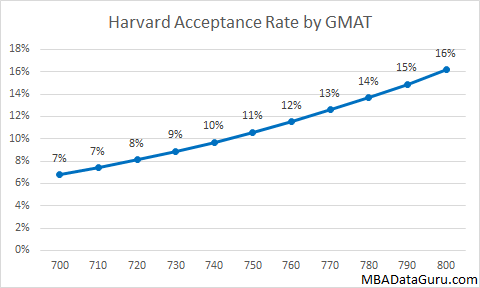How can anyone ensure that they will be accepted to Harvard Business School? Unfortunately there are no assurances at the number one ranked business school which has an acceptance rate of 12%. This analysis will show you what factors impact Harvard Business school acceptance rate, such as GMAT and GPA.
Harvard Business School Acceptance Rate by GMAT
Similar to all other business schools, Harvard does care about your GMAT score. As you can see in the graph below, a higher GMAT results in a better chance of admission. If you want a double digit chance of admission you had better score a 740 or higher. Even at 800 the HBS acceptance rate is surprisingly only predicted to be 16%.
Harvard Business School Acceptance Rate by GPA
Next we look at how GPA affects Harvard Business School acceptance rate. Obviously a higher GPA results in a better chance of admission at HBS. Acceptance rate doesn’t break into the double digits until you hit 3.7. This reminds me of why I didn’t even bother applying to Harvard with my 3.33 GPA. Damn you engineering, why did you ruin my grades?
Harvard Business School Acceptance: GMAT vs. GPA
The real question is which is more important for raising your chance of admission to HBS, GPA or GMAT? In the graph below I compare how much the admissions rate changes if I alter the GMAT or GPA by one standard deviation. A standard deviation is a measure of variance in a population or sample. Since I can’t compare the absolute variance because GMAT and GPA are on different scales, I compare how the shift of one standard deviation impacts the Harvard MBA acceptance rate.
 Unlike at Stern and Wharton, Harvard values GPA over GMAT. Harvard acceptance rate increases by 30% when GPA increases by one standard deviation but only by 25% when GMAT increases by a standard deviation. This indicates that GPA is more important than GMAT at HBS, and they are willing to roll the dice on a candidate with low GMAT like the guy who was accepted last year with a 550.
Unlike at Stern and Wharton, Harvard values GPA over GMAT. Harvard acceptance rate increases by 30% when GPA increases by one standard deviation but only by 25% when GMAT increases by a standard deviation. This indicates that GPA is more important than GMAT at HBS, and they are willing to roll the dice on a candidate with low GMAT like the guy who was accepted last year with a 550.
Other HBS Acceptance Rate Insights
The round you apply in does have an impact on your chance of being accepted at HBS. Applying in a later round significantly reduces your chance of admission at Harvard. The data for round 3 is not statistically significant due to low sample size, but I wouldn’t risk applying in round 3 unless you have a godly application. Perhaps after this recruiting year is over I’ll have enough data to confirm and update the model.
 If you want to maximize your chances of getting into Harvard, then be sure to apply during round 1. Additional work experience does increase your odds of getting into Harvard by a small amount, roughly .5% per year. I’m sure a lot of peoples’ next question is what about the 2+2 program? I do know about the 2+2 program Harvard has but I can’t tell which candidates are applying through the 2+2 program vs. not. However I can tell you that of the 59 people in my sample who are 24 years old or younger , none were admitted. So although it is possible to get in if you are younger, it certainly is more challenging.
If you want to maximize your chances of getting into Harvard, then be sure to apply during round 1. Additional work experience does increase your odds of getting into Harvard by a small amount, roughly .5% per year. I’m sure a lot of peoples’ next question is what about the 2+2 program? I do know about the 2+2 program Harvard has but I can’t tell which candidates are applying through the 2+2 program vs. not. However I can tell you that of the 59 people in my sample who are 24 years old or younger , none were admitted. So although it is possible to get in if you are younger, it certainly is more challenging.
Next I’ll mention a few factors that are out of your control in the short term but should be known so you can plan accordingly. Similar to Wharton, applicants who are applying from India have a lower chance of admissions, only 1.5% of applicants from India are accepted. Applicants who majored in finance also have a significantly lower chance of being admitted, only 2%. And finally applicants who have worked in venture capital or the military have a much higher admissions rate, 16% and 17% respectively.
Update: I took a quick look if I could predict acceptance rate accurately for people who were already selected for an interview. They only factors that had any predictive power were round, age and major. Average acceptance rate is 49%, with older candidates doing a little better about 7% higher acceptance rate for someone a year older than average. Round 2 applicants had a 37% acceptance rate, while round one had a 57% chance. And finally, applicants who majored in finance had a 16% chance of admittance. In the end, it is very difficult to predict admissions for candidates once they have been invited to interview, which suggests that to Harvard the interview actually matters.
Good luck with your Harvard applications!
For undergrads, check out the Harvard acceptance rate analysis at College Admit Me.


Thanks so much for these AMAZING analyses! Really terrific stuff!
One thing caught my eye, though:
“This reminds me of why I didn’t even bother applying to Harvard with my 3.33 GPA. Damn you engineering, why did you ruin my grades?” <– this made me sad! You should have tried anyway!
Just curious — does your data (not just for HBS but for all schools):
1) Look at GPA and major *together*? In my experience, not all GPAs are considered equal. Engineers (especially those who studied in rigorous programs) are given more leeway, as are people who worked during school, encountered a personal / health tragedy, etc.
2) Look at GPA and GMAT together? Even for candidates that have below-average GPAs, it can be countered with an above-average GMAT. I suspect that one reason why the acceptances go down with lower GPA is that there is perhaps a higher probability that those people also had low GMATs….but if someone bucks that trend, AND also has a "Reason" for the low GPA (such as rigorous workload), then it matters less and less.
Granted, I'm not looking at data per se, I'm just observing this *anecdotally* based on people I've worked with. e.g. someone with a 3.1 in History from LargeStateU does face a difficult road, but someone with a 3.1 in Comp Sci from Berkeley can absolutely get into these top schools… so can someone with a 2.9 in physics from Harvard but with a 780 GMAT 🙂
Just curious if you see similar things in your data!
Finally, one thing to keep in mind is that for HBS, kick-ass "leadership" can trump just about anything else. The tough thing is, it can be very difficult to "quantify" that!
Anyway, keep up the great work, and the fascinating analyses!
Thanks for the great comment. I just took a quick look at major and GPA. To my surprise I found that although non-engineers have a higher acceptance rate with an above average GPA, the engineers with lower GPAs have a significantly higher acceptance rate. I have no idea why that would be. My best guess is that engineers with lower GPAs have better EQ. The low GPA engineers have similar GMATs to the high GPA engineers.
Id be curious if that finding holds across most top schools, as an engineer with a slightly lower GPA this is certainly encouraging news 🙂 thanks!
It ABSOLUTELY applies to all top schools. A 3.2 in engineering is definitely not the same (in a good way) than a 3.2 in English Lit. Similarly, a 3.2 in engineering from a “challenging” college is better than one from a less-rigorous school.
This is why they ask to see your full transcript when you apply, and not just to self-report a GPA — on top of things like grade trends, they look for evidence that you challenged yourself….and a lower grade in “tough” course is more easily forgiven than a D in Basket Weaving 101 🙂
This is also why the GMAT serves as the great equalizer — grades can vary from college to college, from major to major, even from one professor to another (teaching the same class), but the GMAT is the same for everyone.
Sincerely,
Maria, also an engineer who had a slightly lower GPA 🙂